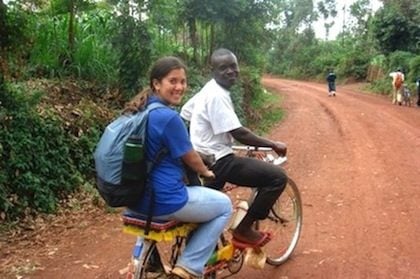Uncategorized

Q: How did you first come to study human origins?
A: During my first semester [of college], I participated in a program in which a small group of freshmen took several classes around one interdisciplinary theme. Knowing that I was interested in science, I chose the one science-oriented theme available at the time – evolution. I had learned next-to-nothing about evolution in high school, and was fascinated with the explanatory power of evolutionary theory.
Q: Once you learned more about evolutionary theory, how did you decide upon a focused area of research?
A: I realized that I loved studying primates in the field and wanted to continue to do so. In order to gain the experience I needed to conduct research in such settings, I took a field position with the Kakamega Monkey Project in Kenya where I managed a team of international and local field assistants. A year later, I entered the graduate program at Columbia and began my doctoral research at the same fieldsite.
Q: What will this grant form The Leakey Foundation help you research and better understand about primates and our own evolution?
A: Sociality is a hallmark of the primate order. The relationship between social and mating systems is an unending source of questions in evolutionary biology. There is an integral connection between social and mating systems, as how individuals are distributed in the environment depends primarily on their strategies for maximizing reproduction. With this research, I want to evaluate the effect of intrasexual competition on male reproduction in primates living in one-male groups.
This project focuses on wild blue monkeys which live in one-male social groups, but in which preliminary genetic evidence suggests (1) a surprising lack of resident male reproductive monopoly and (2) high inter-annual variability in resident and non-resident (i.e. bachelor) male reproductive output.
Male mammals compete with each other for access to fertile females. When animals live in one-male/multi-female groups, the single resident male should have a reproductive advantage over non-residents (i.e. bachelors).
I will investigate this assumption by extracting DNA from fecal samples [which I will non-invasively collect] and assigning paternity to approximately 140 infants born over a ten-year period. Quantifying reproduction by resident and bachelor males will allow me to determine the relative success of reproductive strategies.
I will then use long-term behavioral and demographic records to evaluate how variables including the number of reproductive opportunities, the number of competitor males, dominance rank, and body size affect resident and bachelor reproduction. This model will clarify the relationship between social and mating systems and thereby allow us to better infer patterns of sociality and reproduction in both extant and extinct taxa, including human ancestors.